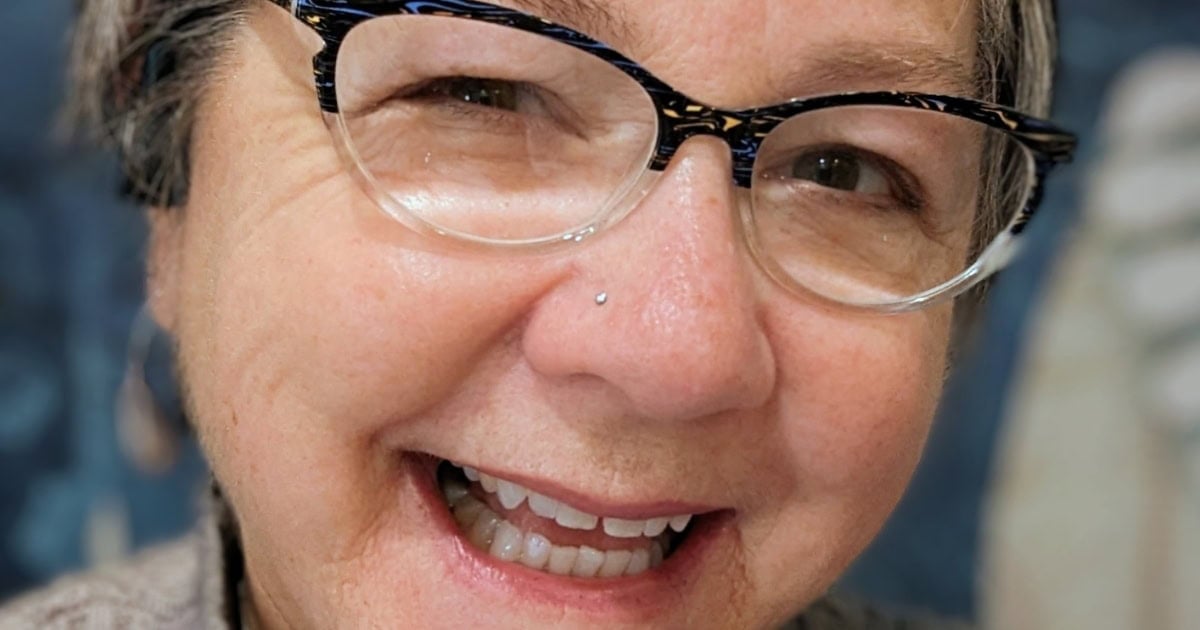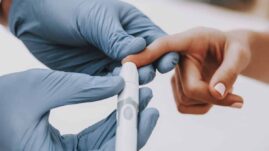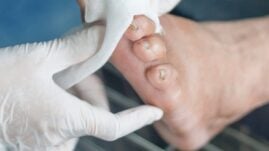Diabetic retinopathy (damage to the retina of the eye) is a common complication that people with diabetes face, especially if they’ve lived with diabetes for a long time.
Diabetic retinopathy affects more than a quarter of all people living with diabetes in the United States and is one of the most severe eye complications caused by the disease. It accounts for approximately 80 percent of the blindness among those with diabetes, yet it remains under-discussed and poorly understood.
We spoke with Anna Kiff, who has been managing type 1 diabetes for 58 years and is currently living with diabetic retinopathy, about how she manages the condition.

Key facts
- Anna Kiff has managed her diabetes with careful blood sugar monitoring and the use of modern diabetes technology, though she has faced challenges, including the development of diabetic retinopathy and undergoing cataract surgery.
- Despite the absence of early symptoms, Kiff’s regular eye care follow-ups revealed retinopathy, leading to effective treatment with Avastin (bevacizumab) injections to prevent further blood vessel damage.
- She maintains her eye health and diabetes management through regular A1c monitoring and lifestyle adaptations, emphasizing the importance of understanding and actively participating in your health care.
- Kiff advocates for early and regular eye screenings to prevent serious complications and
Table of Contents
- Can you share your journey with diabetes and how you first learned about your eye-related complications?
- What were the initial symptoms that prompted you to seek help?
- What specific eye conditions have you been diagnosed with as a result of diabetes (e.g., diabetic retinopathy, glaucoma, cataracts)?
- How have these conditions affected your daily life and vision over time?
- What treatments are you currently undergoing to manage your eye conditions?
- Can you discuss any lifestyle changes you’ve made to help manage both your diabetes and eye health?
- What have been some of the biggest challenges you’ve faced with your condition?
- What advice would you give to others who are newly diagnosed with diabetes-related eye issues?
- How important do you think early screening is in preventing serious eye complications?
- How do you feel about the future and advancements in treatment for diabetic eye diseases?
Can you share your journey with diabetes and how you first learned about your eye-related complications?
Kiff has always been careful about monitoring her blood sugar levels and taking insulin.
She says,
“I’ve always been fairly well-controlled as a T1D [type 1 diabetic]. When I was younger, the term ‘brittle diabetic’ was often used for me. I started my diabetes management as a young girl with glass syringes and insulin. Today, I will use any technology available to me.”
Kiff says that over the decades, diabetes management has gotten much easier and more streamlined, but like with any chronic illness, it is never easy.
She says that back in the early 1990s her doctor told her she had the beginning stages of retinopathy, but that it was nothing serious. In 2017, she had to have double cataract surgery, which led doctors to take a closer look at her eyes for potential diabetes complications.
What were the initial symptoms that prompted you to seek help?
An unsettling aspect of retinopathy is that the earliest stages of the condition do not have any symptoms.
Kiff notes,
“I go yearly for publicly funded eye care follow-ups, and a few years after the cataract surgery it was discovered that my left eye had some leaks that indicated a problem. That’s when I started having Avastin injections in that eye to stop any further blood vessel leakages.”
Kiff says that she gets the injections every four months, and the treatment has been effective so far.
What specific eye conditions have you been diagnosed with as a result of diabetes (e.g., diabetic retinopathy, glaucoma, cataracts)?
Kiff says that her cataracts started developing when she reached her mid-50s, and she sought treatment for them about seven years ago.
She also has diabetic retinopathy, which is stable and controlled for the time being.
How have these conditions affected your daily life and vision over time?
Kiff says,
“My vision can go from slightly blurry to perfect, but it varies daily.”
She points out that the vision changes don’t have anything to do with her retinopathy, but are mostly a result of dryness from the cataract surgery and other medications that she’s on.
Living with diabetes complications can have a varying impact on daily life, ranging from minor to significant. Effectively managing these effects requires careful planning and mindful decision-making each day.
What treatments are you currently undergoing to manage your eye conditions?
Kiff has a good treatment regimen that consists of an injection of Avastin every 4 months. This anti-VEGF (vascular endothelial growth factor) medicine blocks the growth of abnormal blood vessels in the back of the eye. After three years of consistent treatment, her condition is stable and not worsening.
Studies show that injections reduce the risk of developing vision-threatening events by 75 percent after 2 years in people with existing diabetic retinopathy.
Additionally, research shows that anti-VEGF injections can halt the progression of diabetic retinopathy and lower the likelihood of it progressing to diabetic macular edema (swelling of the macula), a more severe complication of diabetic retinopathy.
She continues,
“I’m very lucky; many people go through a lot more with their initial retinopathy diagnosis. I have a few friends that have had more intense eye treatments like vitrectomy, which is more invasive and painful.”
Can you discuss any lifestyle changes you’ve made to help manage both your diabetes and eye health?
Kiff has always been diligent about her diabetes management.
She says,
“I have always managed to keep my blood sugars in range, even before technology. Currently, I manage to keep my A1c in the 6 to 7 percent range. I aim to try to keep my blood sugars between 5 to 10 mmol/L (90 to 180 mg/dL), and very rarely do I spike to crazy levels.”
“Using the right insulins and technology, such as insulin pumps and continuous glucose monitoring systems is key,”
she stressed.
What have been some of the biggest challenges you’ve faced with your condition?
Kiff says that it’s hard for family and friends to actually know what it’s like to have diabetes for most of your life, and the toll it takes on your body.
She says,
“[My family] has never really quite understood the impact of diabetes on a body.”
She also says she has to fight her perfectionist tendencies.
“With technology, I personally now find it’s the mental fatigue of trying to have those perfect numbers. Especially with other diabetics beating their chests about their A1c numbers, eating low carbs, perfect graphs.”
She says that living with her sense of wonder, exploration, and wanderlust can be challenging while managing diabetes and its complications.
“I guess the one big challenge that does get to me is taking a leap of faith and wanting to leave ‘land life’ to live permanently on the water. I accomplished part of this last year, sailing for three months in the ocean to celebrate my diaversary. My worry with the ocean sail, since often we’d be in a remote anchorage, are the what-ifs.”
What advice would you give to others who are newly diagnosed with diabetes-related eye issues?
Kiff says that you have to be diligent and curious.
She explains,
“Question your health care practitioner: their motives and their treatments. Talk to others within the diabetes online community (DOC). Reach out to others who may have been through similar issues. Don’t beat yourself up that you didn’t do the right thing with keeping your blood sugars in balance. I know at the time I felt this way, but it quickly went away, since I thought there’s so much more knowledge out there now about how to slow down progress, and to just do your best.”
She says,
“The main thing is having someone who you can confide in your worries and fears, because I have met others in the same situation, and we all help each other to adjust. We are bettering ourselves by sharing our story and our experiences.”
How important do you think early screening is in preventing serious eye complications?
Kiff says that whether or not you have diabetes, you should have your eyes examined at least every few years.
The American Diabetes Association (ADA) recommends comprehensive eye examinations for diabetes management: People with type 1 diabetes should have their first dilated eye examination within 5 years of their diagnosis, and annually thereafter.
Those with type 2 diabetes are advised to have a comprehensive eye exam at the time of diabetes diagnosis and at least yearly as part of ongoing diabetes management.
For the general adult population without risk factors, the American Academy of Ophthalmology (AAO) suggests that individuals aged 40 to 54 should have an eye examination every 2 to 4 years, and those aged 55 to 64 should be examined every 1 to 3 years.
Regular screening is crucial for early detection and management of potential eye issues, including diabetic retinopathy.
Kiff says it’s also important to know your family’s eye, health, and medical history, as genetics can play a big role in eye health and disease.
How do you feel about the future and advancements in treatment for diabetic eye diseases?
Kiff feels optimistic about future advancements in the treatment for diabetic eye conditions.
She says,
“A big factor for future diabetic eye diseases is the individual taking the reins alongside their healthcare team in trying to keep their blood sugars in balance to prevent the complication in the first place. If you have retinopathy right now, the current procedures do work.”
She continues,
“Having access to well-informed medical practitioners who work together to ensure the best for their patients is crucial. Together, you can learn how to make the most of the tools available to keep your retinopathy from worsening.”
Kiff sums it up:
“I think I’m lucky in a way, that my eye issues only started much later in life since I have no idea as to what my actual control was for the first 20 to 30 years of living with diabetes. Yes, despite this complication, I consider myself lucky indeed.”
Discover more about eye health in Diabetes and Your Eyes: Everything You Need to Know. Did you find this article helpful? Click Yes or No below to let us know!




